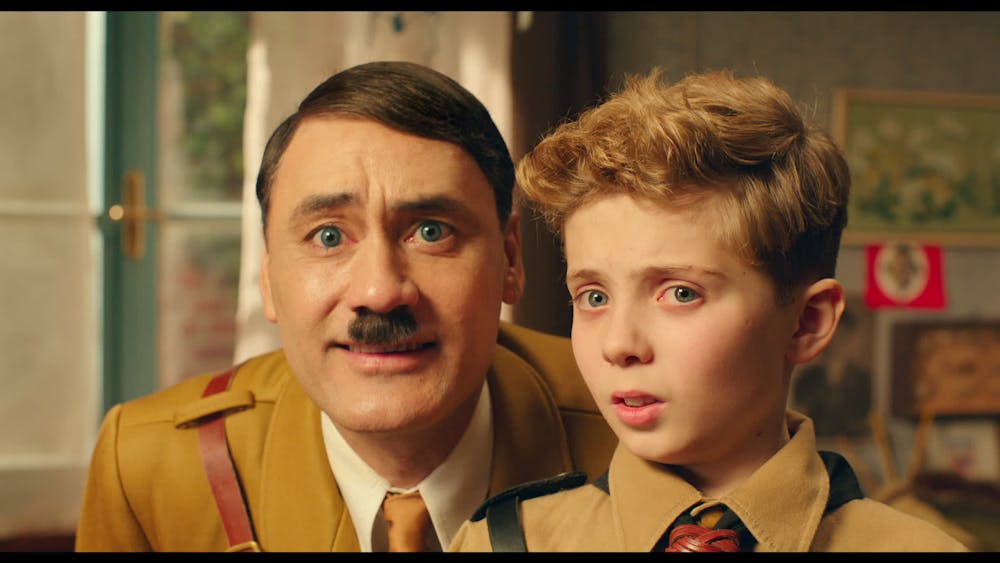The College Town Film Series hosted a triad of movies at the Douglass Theatre in downtown Macon over the past month, one of which was presented jointly by Mercer professors Evey Wilson Wetherbee and Rachel Schaff on Feb. 9. The Film Series has been operated and planned for two decades by Middle Georgia State University professor, Robert Burnham.
Each year, movies seem to permeate a specific theme; this year’s variation incorporated the idea of brainwashing.
“The choice to center on brainwashing was because it had yet to be picked before and because the idea resonated deeply in the time during and after the Second World War,” Burnham stated.
“Jojo Rabbit” was chosen because of how it incorporated the fanaticism of Hitler and Nazism from the perspective of a member of the Hitler Youth. The child and protagonist, Jojo Betzler, is an emphatic supporter of the Nazi party throughout much of the film. Yet throughout the movie, Betzler’s mother provides a voice of reason for Betzler and is a shoulder to lean on for the Jewish girl who hid from the Gestapo, Elsa Korr.
In the first scene, Betzler is encouraged by his imaginary friend, Adolf Hitler, to perfect his salute. The scene is the first indication of how director Taika Waititi uses dark humor to make light of the difficult discussion presented. Throughout the movie, however, the relationship between Betzler and his imaginary friend sours. Over time, support and sympathy turn to anger and annoyance between the two characters.
While the movie is fictitious, there is a certain amount of content that was based on realistic occurrences. Hitler’s anger towards Betzler near the end of the movie was reminiscent of the outbursts that regularly occurred from Hitler near the end of the war when the Allied powers were clearly on the winning side of the equation. With the walls closing in on the Nazi regime, Hitler frequently lashed out at those who he thought had wronged him, both in real life and in the movie.
While some of the scenes are comical, there is an unmistakably serious undertone. There is a danger in taking for granted the comedy of the script. The beginning of the story is made light-hearted because the situation called for it. As was pointed out in the discussion following the film screening, the comedic portion of the movie counteracted the weight of what was being portrayed in the movie.
If any of the jokes had not hit, the movie would have largely, rightfully, been condemned for its crassness. Wanton's humor has no place in this setting, yet Waititi made it work so that the audience sees the ludicrousness of the characters without taking them seriously.
There is something to be said of how Betzler responds to the new world that he sees, once he is out of the cave that was Hitler’s grasp on his imagination. It took a poignant moment in the film for the 10-year-old to realize what side of the war he truly supported. From that point on, Betzler has a different charm in his character. At first, it was his naivety that appealed to the audience, but then it was his earnest care for the hideaway in his home that made the audience sympathize with him for his position.
At the end of the film, Wilson and Schaff took questions and asked for input from the audience.
One particular point was how the movie showed Korr. She was given an active role in the movie and her dialogue was markedly different from that of Anne Frank’s, whose diary was published a few years after the Second World War ended. Frank’s diary was far more involved in her personal life whereas Korr’s role in the movie was more concerned with staying safe and remaining undetected from the Gestapo.
Korr was also a somewhat unwilling teacher for Betzler. Like the instructor who forces the student to understand every intricacy of the subject through trial and error, Korr gave Betzler a lifelong lesson in humanity. She never told him exactly about her heritage—that Jews were no different from him—but he figured it out along the way despite her passive approach.
This was the last movie of the series, but there will be another set of films in the coming months. Mercer students can get in for free with their student ID and general admission is $5.
Gabriel Kopp '26 is majoring in Journalism and Law and Public Policy at Mercer University. He has written for The Cluster since he started at Mercer, and currently works as co-Editor-in-Chief. When he isn't studying, he enjoys going for runs and reading The New York Times or the AJC while sipping coffee.





